I just lit the D'Angelo candle that I received at D'Angelo's Black Messiah listening party while I write this because, honestly, how does one even begin to think about D'Angelo, to write about D'Angelo, without the proper vibes in place? D'Angelo is the king of vibes. D'Angelo has the most important vibes. Black Messiah is an album that one can quite easily vibe to—it's quiet, early morning listening music and familiar late night decompressing music and any time of day restorative music. The candle, incidentally, has a really pleasant citrus smell which I assume is lime because the company that made it is called Brooklyn Limegreen. I got back about an hour ago from listening to Black Messiah about one and a half times through, and I'm happy to report that, after 14 years of keeping us waiting, D'Angelo somehow managed to meet expectations. This is an album that will take a lot of time to live with and absorb to fully appreciate, but I can say, immediately, that it is really good. It isn't necessarily a huge departure from Voodoo; it sounds like a D'Angelo album, and that's a good thing. It leans in harder into jazz rhythms and funk textures, maybe—there are several extended sections that are basically just stripped-down jazz interludes of guitars and drums. Structurally, it's predictably indistinct and meandering, but there's nothing that doesn't feel deliberate. It's full of sex, but there's also a lot of thinking about sex and thinking about relationships, as well as healthy doses of politics and nostalgia. In fact, the nostalgia's probably the most immediate thing about it—it feels like something straight out of your memories, something that you've lived with for a long time already and know innately because it's steeped in the sounds and textures and soul of American music. As much as D'Angelo has been a subject of hype and fascination and obsession in the last few years as a younger generation has rediscovered him, his appeal has always been that he seems to cut straight through to our most elemental emotional state and channel something subconscious. That's repeated here, I think.But don't take my word for it! Black Messiah will be out in a matter of hours: Among the revelations from the listening party is that it's coming out digitally at midnight tonight. You, too, can listen along soon. Although the first song released was "Sugah Daddy," the first single is called "Really Love," and it's being serviced to radio tomorrow. The full tracklist and lyrics from a booklet provided are all below.Which brings me around to another really important point about the album: As much as it is about love and memory and all that, it is also political. In some cases this is explicit. On "Till It's Done (Tutu)" there's a verse about climate change, while "The Charade," which first emerged a couple years ago, addresses race with lines like "degradation so loud that you can't hear the sound of our cries" and "all we wanted was a chance to talk / 'stead we only got outlined in chalk" that seem particularly prescient given the current conversation in America about racialized violence and oppression (a statement at the beginning of a pamphlet we were given explains that the term "Black Messiah" is "about people rising up in Ferguson and in Egypt and in Occupy Wall Street and in every place where a community has had enough and decides to make change happen"). There's also an implicit political statement in this album, which is in the way it so seamlessly synthesizes the traditions of black American music and asserts that identity.
I got back about an hour ago from listening to Black Messiah about one and a half times through, and I'm happy to report that, after 14 years of keeping us waiting, D'Angelo somehow managed to meet expectations. This is an album that will take a lot of time to live with and absorb to fully appreciate, but I can say, immediately, that it is really good. It isn't necessarily a huge departure from Voodoo; it sounds like a D'Angelo album, and that's a good thing. It leans in harder into jazz rhythms and funk textures, maybe—there are several extended sections that are basically just stripped-down jazz interludes of guitars and drums. Structurally, it's predictably indistinct and meandering, but there's nothing that doesn't feel deliberate. It's full of sex, but there's also a lot of thinking about sex and thinking about relationships, as well as healthy doses of politics and nostalgia. In fact, the nostalgia's probably the most immediate thing about it—it feels like something straight out of your memories, something that you've lived with for a long time already and know innately because it's steeped in the sounds and textures and soul of American music. As much as D'Angelo has been a subject of hype and fascination and obsession in the last few years as a younger generation has rediscovered him, his appeal has always been that he seems to cut straight through to our most elemental emotional state and channel something subconscious. That's repeated here, I think.But don't take my word for it! Black Messiah will be out in a matter of hours: Among the revelations from the listening party is that it's coming out digitally at midnight tonight. You, too, can listen along soon. Although the first song released was "Sugah Daddy," the first single is called "Really Love," and it's being serviced to radio tomorrow. The full tracklist and lyrics from a booklet provided are all below.Which brings me around to another really important point about the album: As much as it is about love and memory and all that, it is also political. In some cases this is explicit. On "Till It's Done (Tutu)" there's a verse about climate change, while "The Charade," which first emerged a couple years ago, addresses race with lines like "degradation so loud that you can't hear the sound of our cries" and "all we wanted was a chance to talk / 'stead we only got outlined in chalk" that seem particularly prescient given the current conversation in America about racialized violence and oppression (a statement at the beginning of a pamphlet we were given explains that the term "Black Messiah" is "about people rising up in Ferguson and in Egypt and in Occupy Wall Street and in every place where a community has had enough and decides to make change happen"). There's also an implicit political statement in this album, which is in the way it so seamlessly synthesizes the traditions of black American music and asserts that identity. Speaking before playing the album, the author Nelson George and D'Angelo's friend Questlove reiterated these ideas. George pointed out "the depth of [D'Angelo's] musical knowledge and his understanding of American music" and noted "how smart and politically conscious he is." "The man is speaking to the times we live in," he added. Questlove described Black Messiah as "the Apocolypse Now of black music." He added, "It's everything: It's beautiful, it's ugly, it's truth, it's lies."A few other notes: Questlove also explained the album was recorded fully analog on tape and commented on what D'Angelo has been up to for 14 years by saying "He's really been improving and sprucing up his guitar playing." There is a lot of guitar on the album, and supposedly a lot of it is him. A lot of it is also dope: There's a crazy solo at the end of the big, chaotic, cacophonous highlight "1000 Deaths," and sick little stabs of guitar squirming through the background of "Prayer," which has the feel of a Sam Cooke soul classic. It's pretty much all highlights, but I also loved the pillowy jazz of "Really Love" and the laid-back funk and nostalgia of the "Back in the Future" duo (also a key line, re: D'Angelo's physique, which supposedly became a bit of a curse for him: "So if you're wondering about the shape I'm in / I hope it ain't my abdomen that you're referring to"). "The Door" is almost like a lullaby. My favorite song on first listen was probably the closer "Another Life," which is probably the biggest the sound gets on the album and the smoothest D'Angelo's voice sounds. It's full of piano flourishes and big guitars, and it feels like you're soaring into the wide open sky or something.
Speaking before playing the album, the author Nelson George and D'Angelo's friend Questlove reiterated these ideas. George pointed out "the depth of [D'Angelo's] musical knowledge and his understanding of American music" and noted "how smart and politically conscious he is." "The man is speaking to the times we live in," he added. Questlove described Black Messiah as "the Apocolypse Now of black music." He added, "It's everything: It's beautiful, it's ugly, it's truth, it's lies."A few other notes: Questlove also explained the album was recorded fully analog on tape and commented on what D'Angelo has been up to for 14 years by saying "He's really been improving and sprucing up his guitar playing." There is a lot of guitar on the album, and supposedly a lot of it is him. A lot of it is also dope: There's a crazy solo at the end of the big, chaotic, cacophonous highlight "1000 Deaths," and sick little stabs of guitar squirming through the background of "Prayer," which has the feel of a Sam Cooke soul classic. It's pretty much all highlights, but I also loved the pillowy jazz of "Really Love" and the laid-back funk and nostalgia of the "Back in the Future" duo (also a key line, re: D'Angelo's physique, which supposedly became a bit of a curse for him: "So if you're wondering about the shape I'm in / I hope it ain't my abdomen that you're referring to"). "The Door" is almost like a lullaby. My favorite song on first listen was probably the closer "Another Life," which is probably the biggest the sound gets on the album and the smoothest D'Angelo's voice sounds. It's full of piano flourishes and big guitars, and it feels like you're soaring into the wide open sky or something.
2. "1000 Deaths"
3. "The Charade"
4. "Sugah Daddy"
5. "Really Love"
6. "Back in the Future (Part I)"
7. "Till It's Done (Tutu)"
8. "Prayer"
9. "Betray My Heart"
10. "The Door"
11. "Back in the Future (Part II)"
12. "Another Life"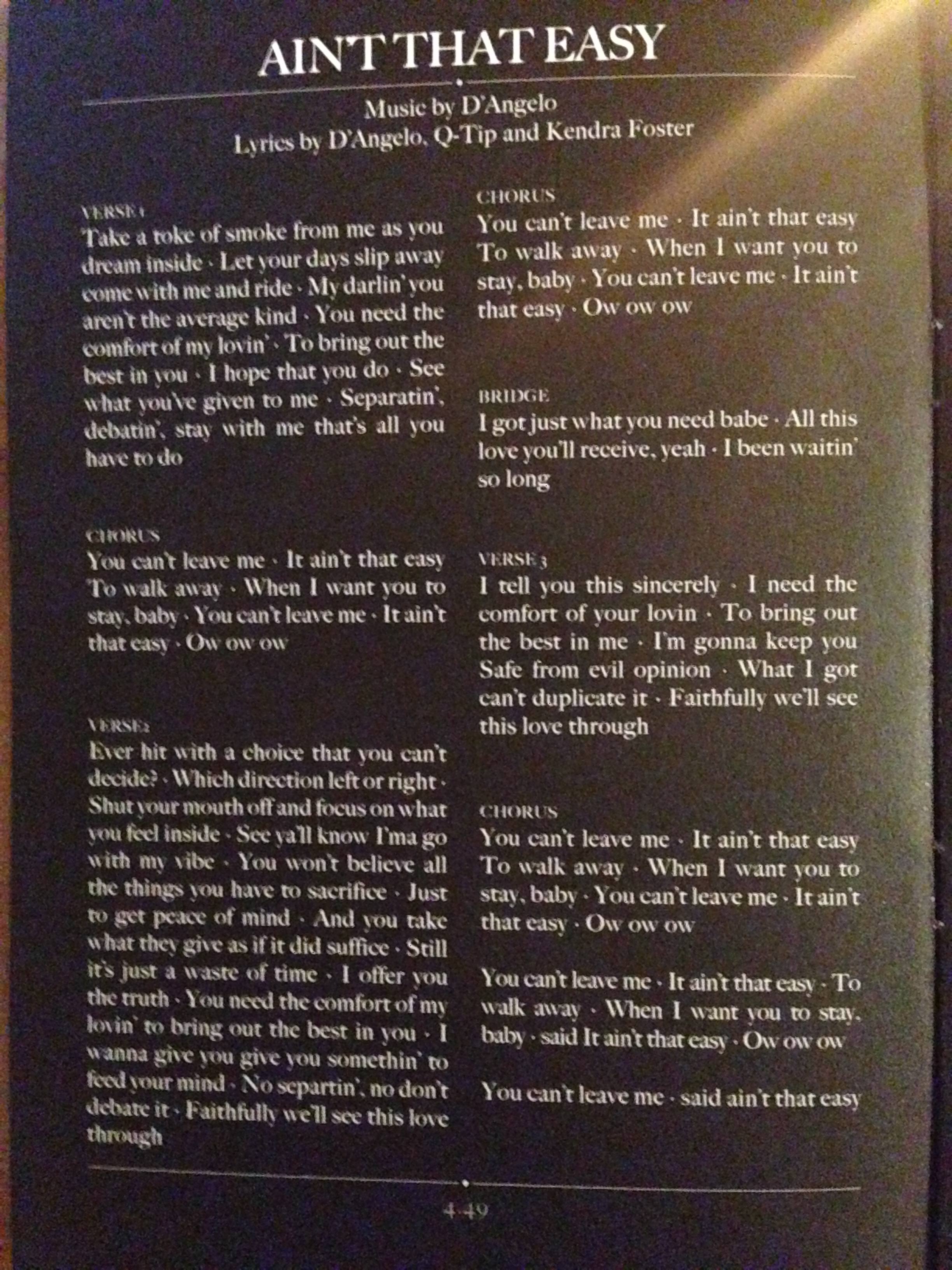



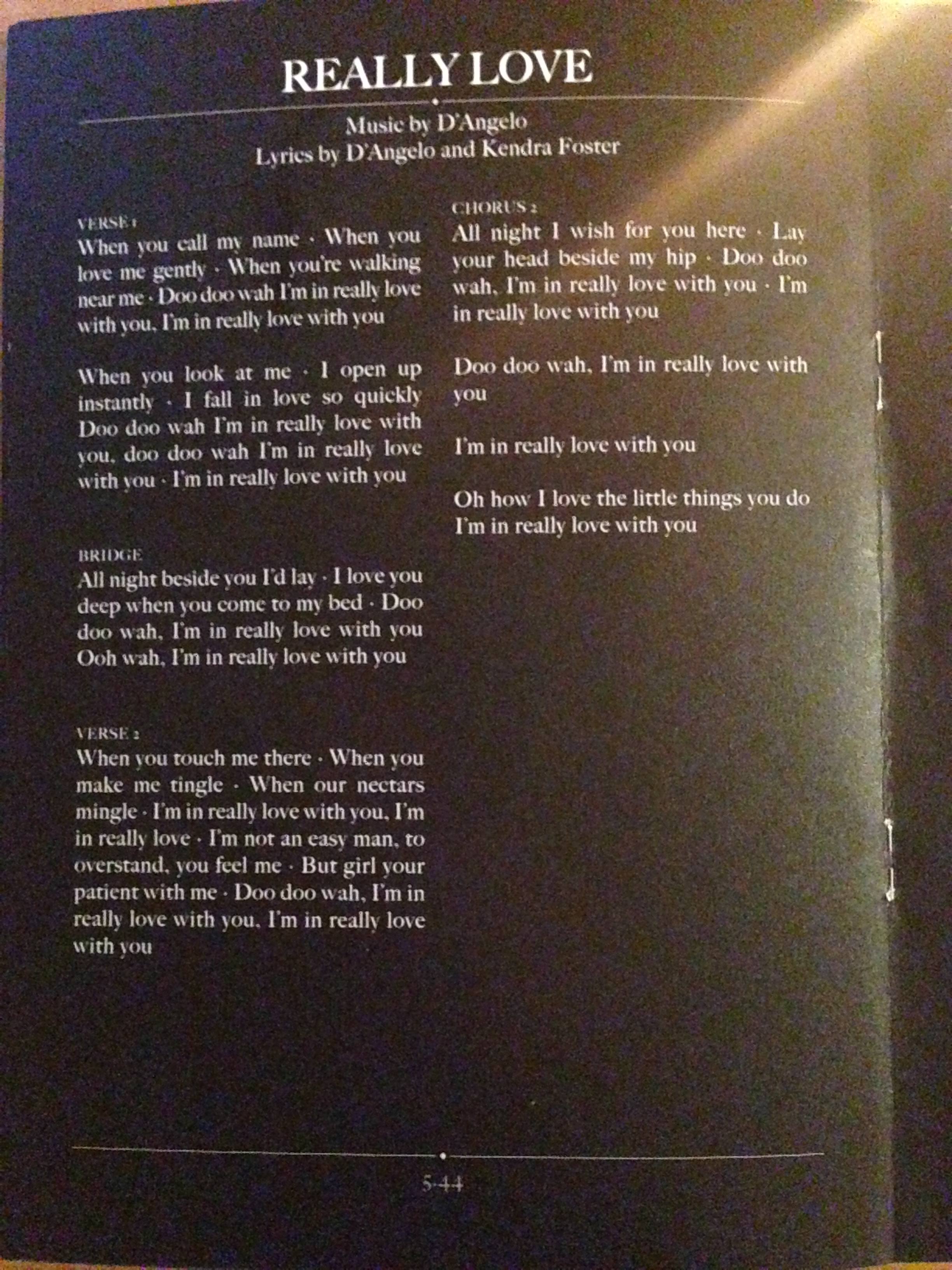
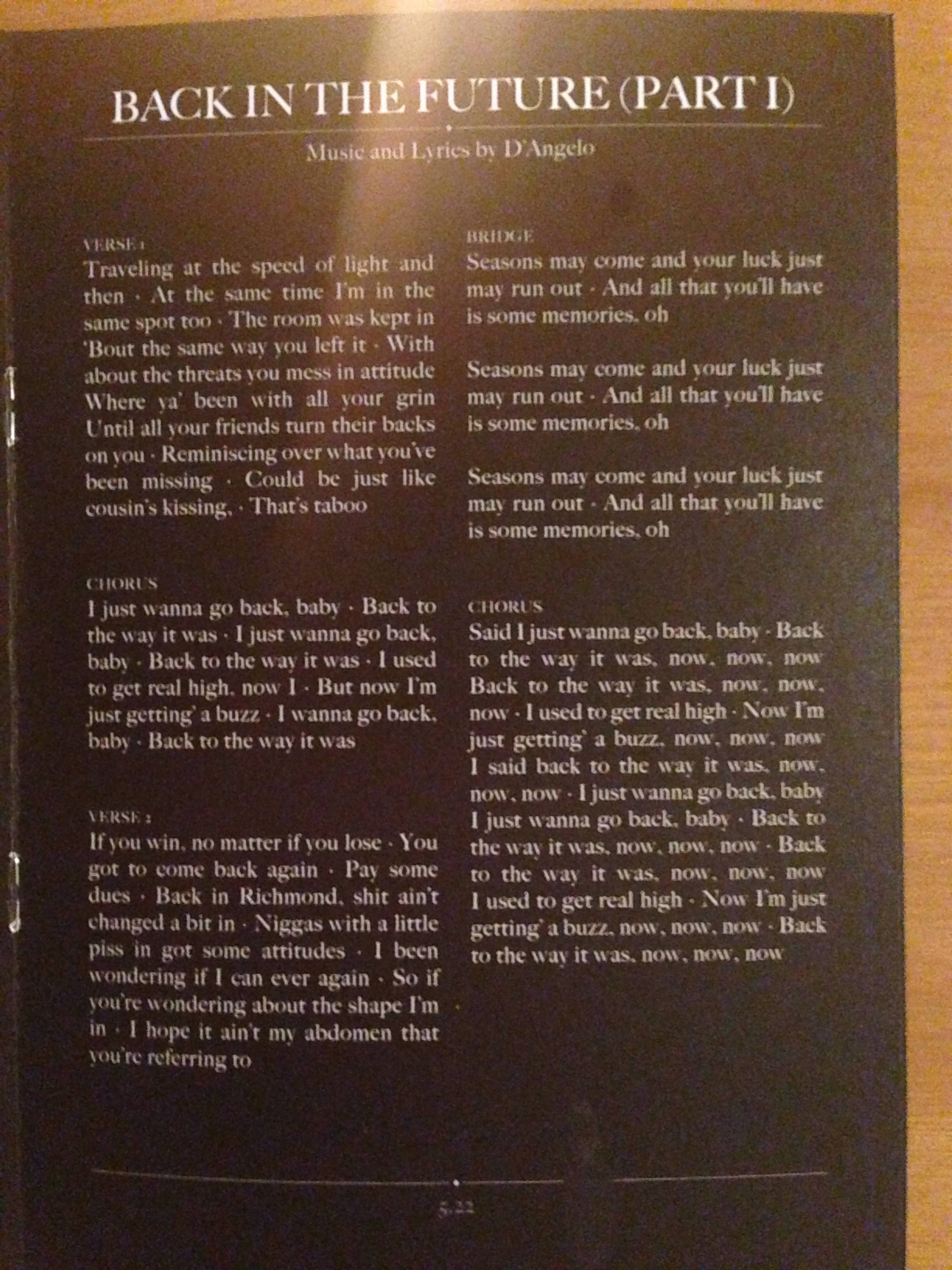
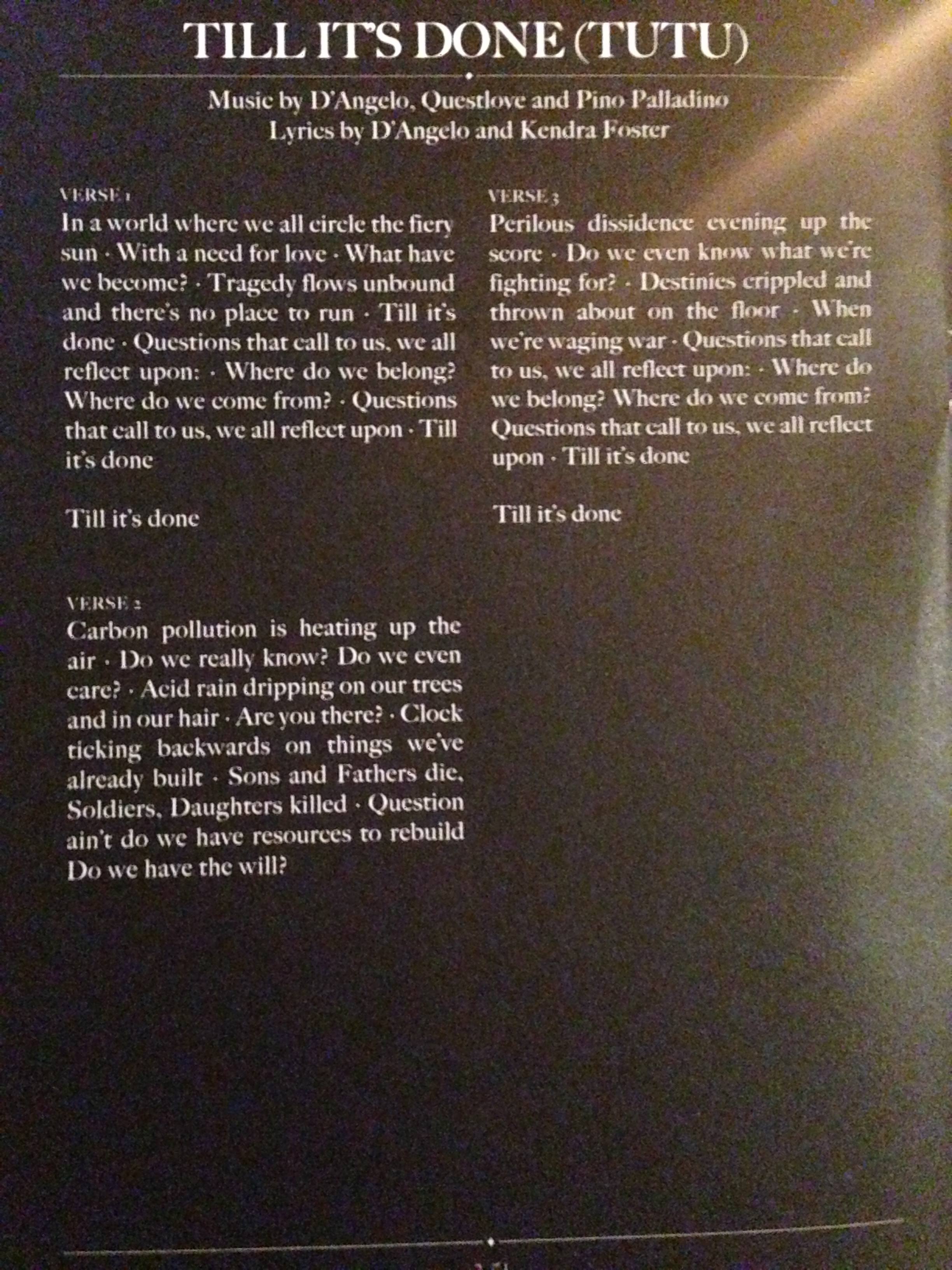
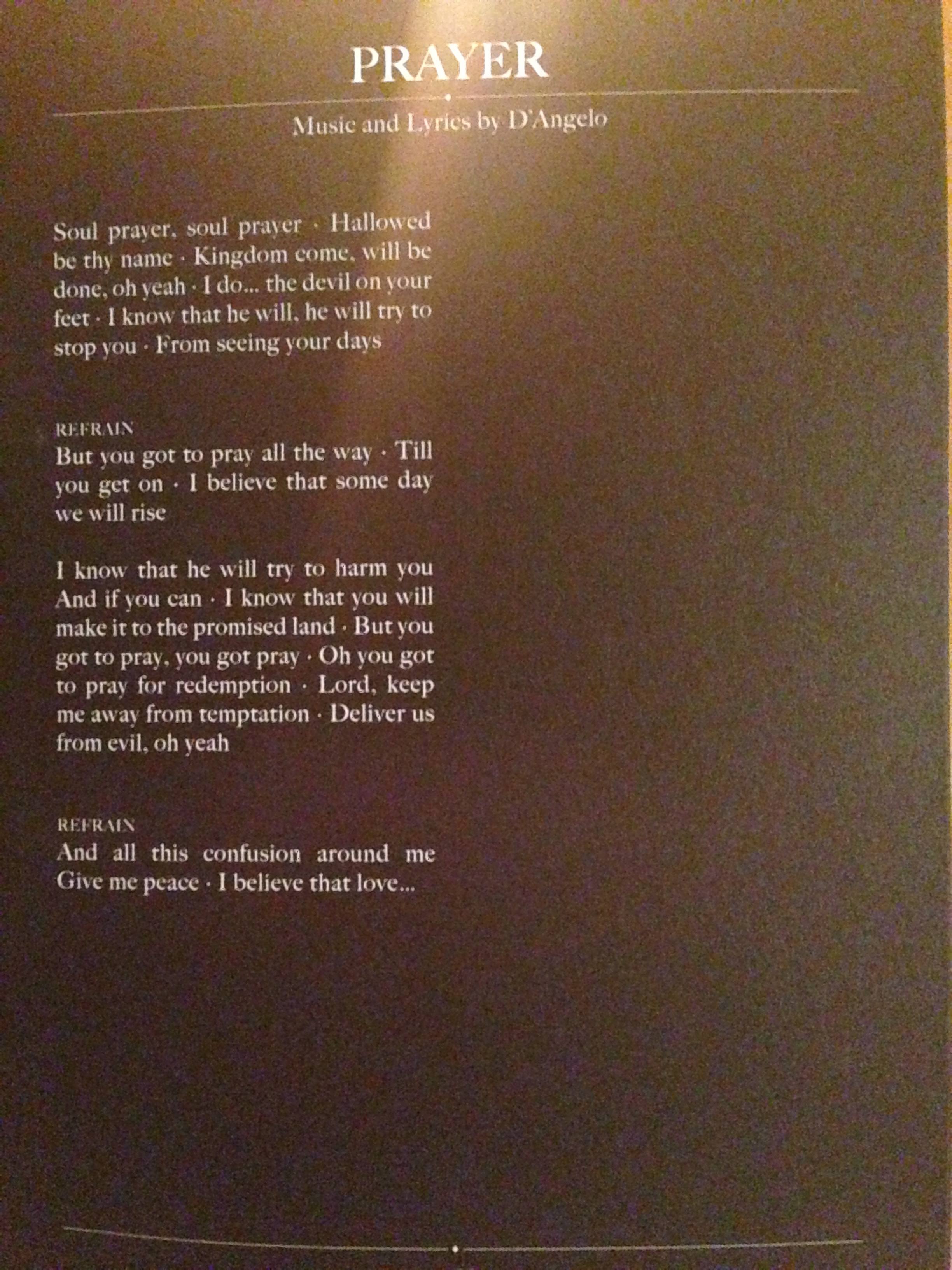
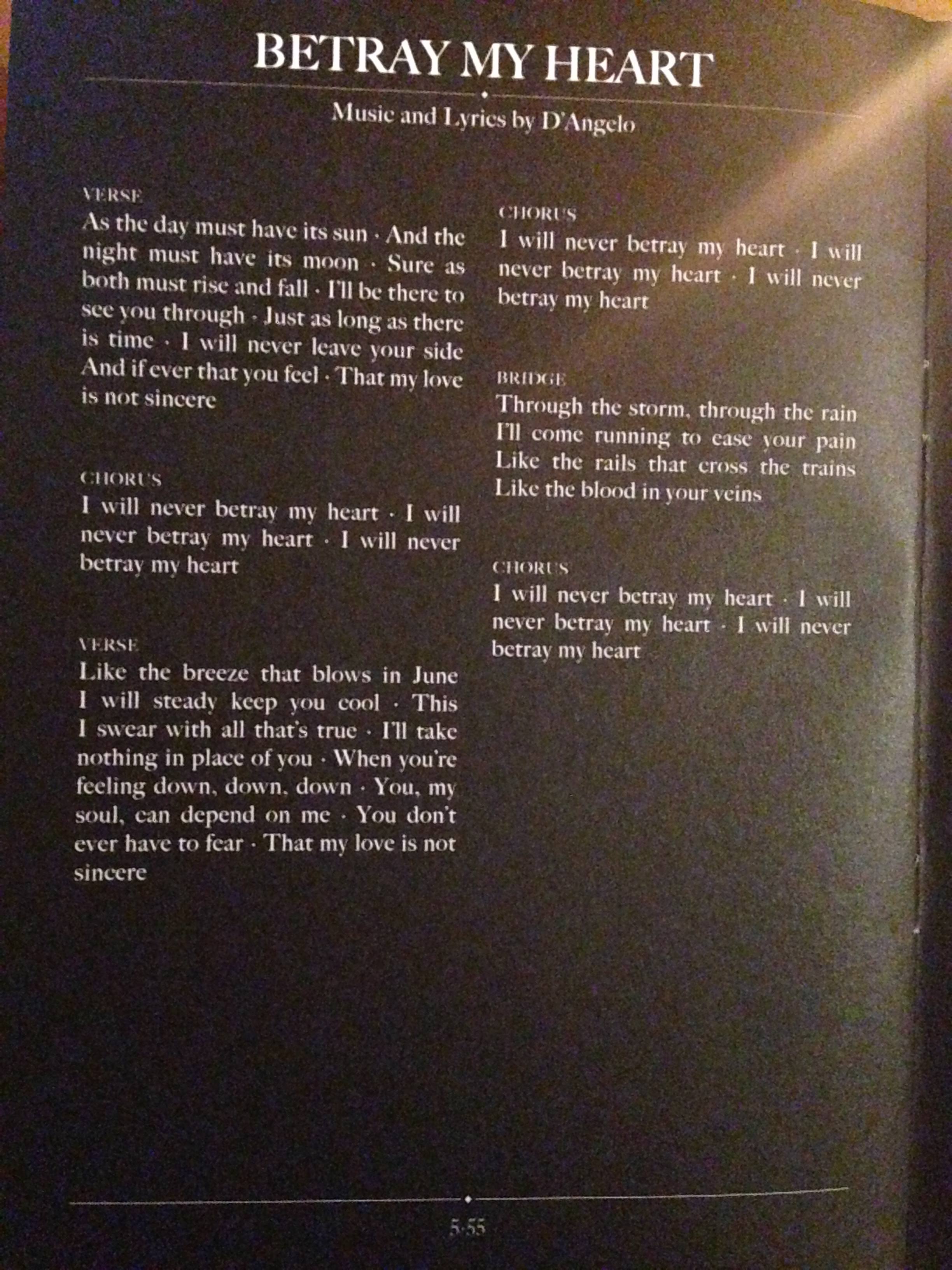


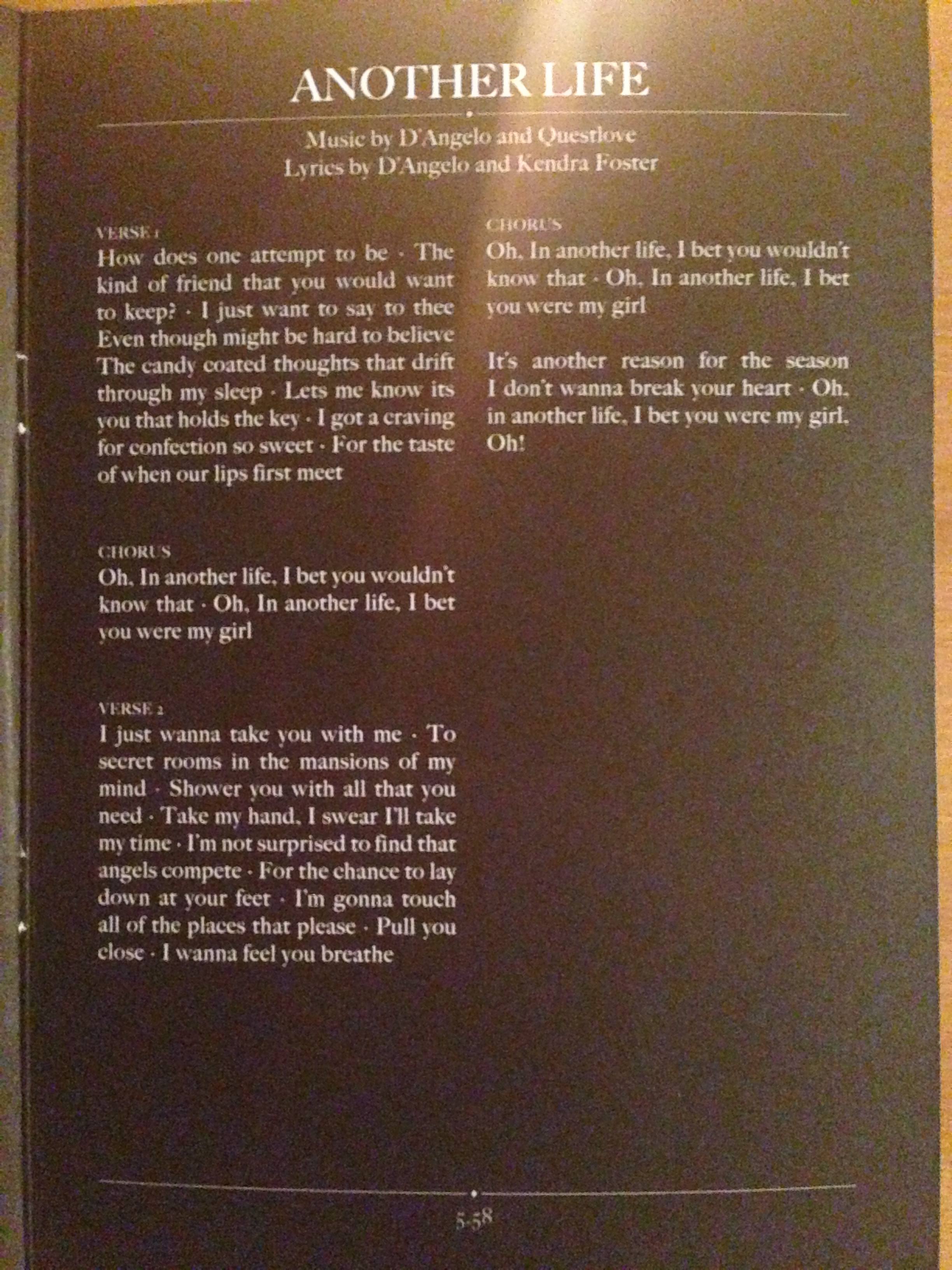
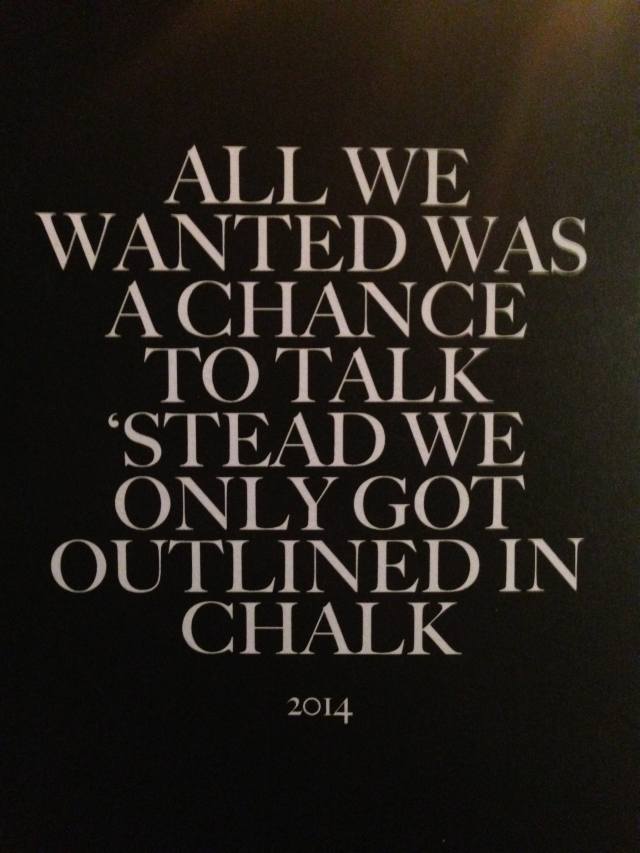 Follow Kyle Kramer on Twitter.
Follow Kyle Kramer on Twitter.
Advertisement

Advertisement
Advertisement

Advertisement
UPDATE: Black Messiah is now available on iTunes.
Here's the tracklist and lyrics:1. "Ain't That Easy"
2. "1000 Deaths"
3. "The Charade"
4. "Sugah Daddy"
5. "Really Love"
6. "Back in the Future (Part I)"
7. "Till It's Done (Tutu)"
8. "Prayer"
9. "Betray My Heart"
10. "The Door"
11. "Back in the Future (Part II)"
12. "Another Life"













